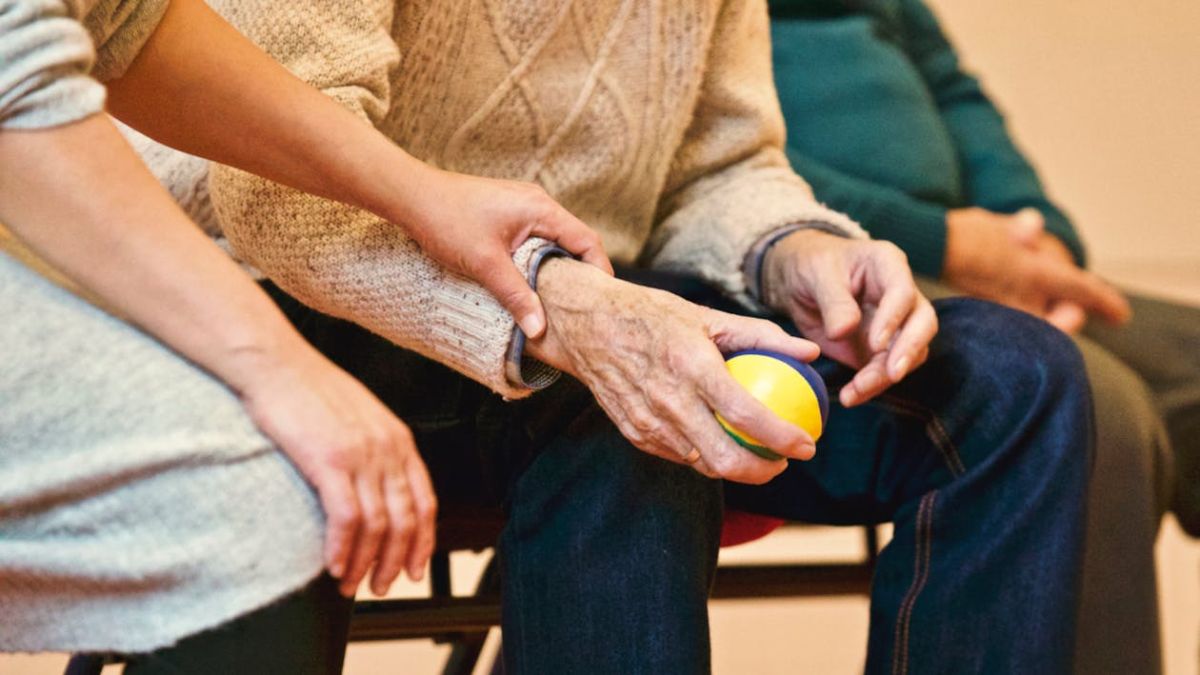
World Osteoporosis Day: Taking Care of Your Bones
Today, we’re shining a spotlight on a day that’s all about your bones – World Osteoporosis Day! Having just taken place on October 20th, World Osteoporosis Day is a day to appreciate and educate yourself about the significance of bone health. Just as you take care of your heart, your brain, and your overall well-being, it’s crucial to give your bones some love and attention too.
At True Care, we support people living with osteoporosis to live full and active lives even with the limitations that the condition can impose. Read on to learn what osteoporosis is, what makes it more likely to occur, and how you can take care of your bones to minimize your chances of developing osteoporosis as you get older.
What is Osteoporosis?
Think of your bones as the strong foundation of your body, supporting you in everything you do. From taking a walk in the park to dancing with your friends, your bones are always there for you, lending structure and support to your entire frame.
Osteoporosis is a condition wherein bones are more fragile than they should be. Think of your bones as the strong foundation of a building. Osteoporosis weakens this foundation, making it easier for bones to fracture, or break. The bones become porous, thinner, and overall weaker. This can lead to severe limitations in mobility if they experience fractures over and over again.
With osteoporosis, even small movements or impacts can result in a bone becoming broken. These seemingly small factors include things like falling, bumping into objects, or even sneezing, which can make managing osteoporosis challenging.
What Makes Osteoporosis More Likely?
Several things can increase your chances of getting osteoporosis. These risk factors include:
Age: Osteoporosis becomes more common as you get older. That being said, osteoporosis is not a condition that affects only seniors; symptoms can start as early as your 30s.
Sex: Female bodies are more likely to develop osteoporosis than male ones. This has to do with hormonal changes that take place in the female body following menopause.
Family History: Sometimes, osteoporosis can run in families. For example, if your grandmother or one of your parents has or had osteoporosis, you may be more likely to develop it yourself.
Diet and Lifestyle: Not getting enough calcium (a bone-strengthening nutrient) or vitamin D, and not doing enough activities that put weight on your bones, which strengthens them, can increase your likelihood of developing osteoporosis.
Medications and Health Conditions: Some medicines and certain health problems can make osteoporosis more likely. This could be because the medications themselves affect bone health directly, or because they increase the likelihood of falling and potentially fracturing a bone.
How Can I Manage Osteoporosis?
The good news is, there are ways to take care of your bones if you’ve been diagnosed with osteoporosis. Your healthcare team can help with:
Medications: Building Bone Strength If you’ve been diagnosed with osteoporosis, your healthcare team can offer solutions to boost your bone strength. There are medications specifically designed to make your bones stronger. These medicines work by increasing bone density, reducing the risk of fractures, and helping you maintain better bone health. Your healthcare provider will work with you to determine the right medication and dosage based on your individual needs.
Nutrition: Fueling Your Bones When it comes to maintaining healthy bones, nutrition plays a crucial role. Eating the right foods can provide your body with the essential nutrients it needs to keep your bones strong. Calcium and vitamin D are your bone’s best friends. Calcium is like the bricks in the bone-building process, and vitamin D acts as the construction worker, helping your body absorb calcium effectively. You can find calcium in dairy products like milk, yogurt, and cheese, as well as in leafy greens and fortified foods. Vitamin D comes from sunlight, but you can also get it from certain foods like fatty fish, eggs, and fortified cereals. Your healthcare team can provide guidance on the best dietary choices to support your bone health.
Exercise: Staying Active for Strong BonesStaying active is not just great for your overall health, but it’s especially important for your bones. Weight-bearing activities like walking, dancing, and gardening are like a workout for your bones. They put mild stress on your bones, which in turn stimulates bone growth and makes them denser. Regular physical activity can help maintain and improve bone strength. It’s not about running marathons; even a daily stroll in the park can make a big difference. Your healthcare team can help you design a safe and effective exercise routine that suits your abilities and needs.
Safety: Preventing Falls, Preserving Bones
When you have osteoporosis, preventing falls is a top priority. Falls can result in fractures that are harder to heal when your bones are already weakened. That’s why taking steps to avoid falling is so important. Here are some fall-prevention measures to consider:
- Keep your living space clutter-free and well-lit to reduce tripping hazards.
- Install handrails and grab bars in areas where you need support, like the bathroom and stairways.
- Wear supportive, non-slip footwear to maintain balance.
- Use assistive devices if necessary, such as canes or walkers, to prevent accidents.
By prioritizing safety, you can minimize the risk of falls and protect your bones from further harm.
Remember, with the right support and guidance, you can proactively manage osteoporosis and keep your bones as healthy as possible. It’s all about taking proactive steps to ensure you live a strong and active life, no matter your age. Your bones are incredible, and they deserve the best care you can give them.
Preventing Osteoporosis
Preventing osteoporosis is even better than treating it. To keep your bones in great shape:
Eat Right: Fuel Your Bones with a Balanced Diet
Eating a balanced diet gives your bones the right kind of energy they need to stay strong. Here’s what that means:
- Dairy Delights: Dairy products like milk, yogurt, and cheese are rich in calcium, a key building block for your bones. Opt for low-fat or non-fat options if you’re watching your calorie intake.
- Leafy Greens: Dark, leafy greens such as kale, spinach, and collard greens are excellent sources of calcium and other nutrients that support bone health. They’re not only nutritious but also versatile and can be incorporated into salads, smoothies, and various dishes of all kinds. Experiment with different preparation methods to see which greens you like the best!
- Nutrient-Rich Foods: In addition to dairy and leafy greens, consider foods fortified with calcium and vitamin D. Fortified cereals, juices, and certain plant-based milk alternatives can provide these essential bone nutrients, especially for those with dietary restrictions or food aversions.
Stay Active: Fun Ways to Strengthen Your Bones
Staying active doesn’t mean you have to become a super intense gym enthusiast. It’s all about finding activities you enjoy and can do consistently to keep your bones in great shape:
- Walking: A daily walk is a fantastic way to improve your bone health. You can take a leisurely stroll in the park or make it a social activity by walking with friends.
- Dancing: Whether it’s ballroom, salsa, or just dancing to your favorite tunes in your living room, dancing is a fun and effective way to give your bones a workout.
- Gardening: Gardening not only connects you with nature but also keeps you moving. Digging, weeding, and tending to plants are all weight-bearing activities that can contribute to stronger bones.
Lifestyle Choices: Making Bone-Healthy Decisions
Your lifestyle choices can have a big impact on your bone health. Here’s what you can do:
- Limit Alcohol: Excessive alcohol consumption can weaken your bones. If you choose to drink, do so in moderation. That means no more than one drink per day for women and two drinks per day for men.
- Quit Smoking: Smoking is not just harmful to your lung health; it can also negatively affect your bone health. Quitting smoking is one of the best things you can do for your overall well-being, including for your bones.
Regular Check-Ups: Stay Informed about Your Bone Health
Keeping an open line of communication with your healthcare provider is essential for managing your bone health. Here’s how regular check-ups can help:
- Bone Density Tests: Your healthcare provider can monitor your bone health through bone density tests. These tests can help identify any changes in your bone strength and guide your treatment plan.
- Medication Adjustments: If you’re taking medications for osteoporosis, your healthcare provider will assess how well they’re working and whether any adjustments are needed. Dosage can change over time, which is why it’s so important to be seen at regular intervals.
- Nutritional Guidance: Your healthcare team can provide dietary recommendations to ensure you’re getting the right nutrients to support your bones.
By focusing on these elements of bone care – nutrition, physical activity, lifestyle choices, and regular communication with your healthcare provider(s) – you’ll be well on your way to maintaining strong and healthy bones throughout your life. Your bones are remarkable structures that deserve the best care you can provide.
True Care: Your Osteoporosis Support System
If you or someone you care about is facing challenges due to osteoporosis, you don’t have to face them alone. True Care Home Care is here to lend a helping hand. Our team is just a phone call away, ready to connect you to the resources you need from the comfort of your own home. We’re your friends, your neighbors, and your support system. Let’s work together to make sure your journey with osteoporosis is as smooth as possible. Together, we can build a strong foundation for your health and well-being.
Remember, your bones are remarkable – and so are you!





